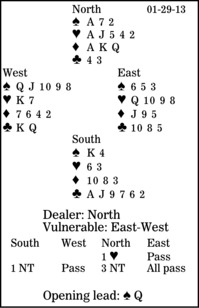Bridge column, January 29: Play the card known to be yours

Benjamin Franklin said, "An investment in knowledge pays the best interest."
At the bridge table, we try to use the knowledge gleaned from the bidding and the play (as it progresses) to make informed decisions. How should the play go in this three-no-trump contract after West leads the spade queen? What is the key piece of knowledge declarer wants and East must keep hidden?
South starts with seven top tricks: two spades, one heart, three diamonds and one club. He could attack either hearts or clubs, but the minor suit offers much better chances for three tricks.
Declarer ducks the first trick, takes the second spade with his king, plays a diamond to dummy's queen, and leads a club to his nine. West wins this with, say, the queen (he should vary his play in this situation) and continues with another spade to dummy's ace.
Now comes dummy's last club. What happens next?
If East carelessly plays his eight, South should put up his ace, dropping West's king and collecting 11 tricks. Why should he drop the king?
Given that East is known to have the club 10 from the first round of the suit, when East plays the club eight second, he started with 10-8-5 or K-10-8-5. In the second case, the contract is unmakable.
However, on the second round of clubs, East should follow the excellent principle of playing the card he is known to hold. If he puts up the 10, declarer will place him with K-10-5, finesse his club jack, and go down three.
** ** **
COPYRIGHT: 2013, UNITED FEATURE SYNDICATE
DISTRIBUTED BY UNIVERSAL UCLICK FOR UFS

